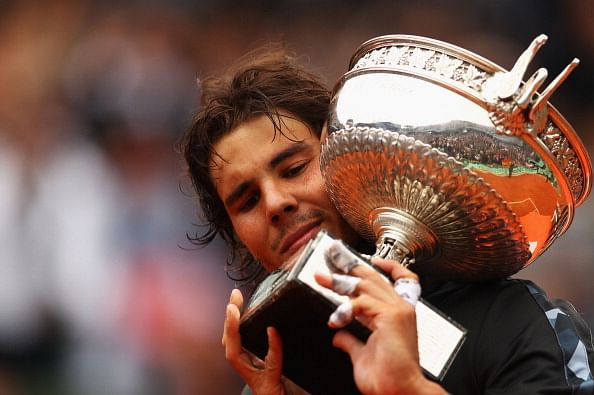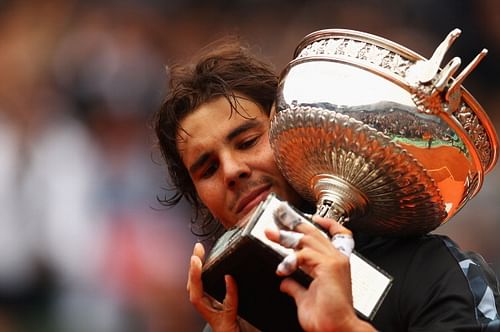
Exploits of a champion: A look back at Rafael Nadal's seven French Open wins

If there were any doubts lingering in the minds of tennis fans as to who the greatest claycourter of all time was, they were firmly put to rest on a cloudy Monday afternoon last June in Paris as Rafael Nadal defeated Novak Djokovic to win an unprecedented seventh French Open crown. The Spaniard’s sheer dominance on clay over the past decade had been enough to convince most that he is the greatest ever, but now he also had the numbers to back it up, as he surpassed the legendary Bjorn Borg’s record of six French Open titles. As we approach yet another fortnight in Paris, the eyes of the world are firmly focussed on Nadal as he seeks to win an unbelievable eighth title. While that may well be on the cards, let’s take a short trip down memory lane as we recap his seven victorious French Open campaigns thus far.
1. 2005
The beginning
At the start of 2005, Nadal was considered someone to look out for. Decent results in the Grand Slams the previous year along with a massive victory over World No.1 Roger Federer in Miami had led experts to point to Nadal as the man who could possibly give Federer a run for his money, albeit in a couple of years, given that he was only 18 years old. Nadal, however surprised the tennis world and also possibly himself as he started racking up victories by the dozen as the clay court season progressed, winning titles in Monte Carlo, Barcelona and Rome. He carried this form through to the French Open, reaching the semifinals with ease where he met Federer for the first time in a Grand Slam. In what was the most highly anticipated match of the year, Nadal overcame his nerves and a relentless Federer to win in 4 sets and repeated the feat in the final against the unheralded Argentine, Mariano Puerta, to capture his first Grand Slam title just a few days after his 19th birthday.
2. 2006
Consolidating the hold
Nadal was now no longer the pretender. The previous year had seen him break through and capture titles and break records and make a huge impact, which now put added pressure on him to live up to his exploits. The Spaniard suffered from injury at the beginning of the year, which forced him to miss the first couple of months of the year, including the Australian Open. However, by the time his beloved claycourt season rolled around, Nadal was back to his best, retaining his titles in Monte Carlo, Barcelona and Rome, beating Federer in two of those finals. Arriving at Roland Garros as defending champion, Nadal was tested in the early rounds, needing four sets to beat both Paul Henri-Mathieu and Lleyton Hewitt in the third and fourth rounds respectively. A first meeting with Djokovic in the quarterfinals was handled with ease by Nadal as was the semifinal against an in-form Ivan Ljubicic and tennis fans finally had their dream final matchup as Federer and Nadal met in a Grand Slam final for the first time ever. Federer was in imperious form himself, and looked eager to avenge his loss to Nadal the previous year, as he stormed through the first set with a 6-1 scoreline. Nadal, though, showed maturity and poise far beyond his years as he shrugged off that early setback to win the next three sets, the last one in a tiebreaker, as he retained his Roland Garros title.
3. 2007
Surely this year will be different?
Nadal had handled the pressure and expectations relatively well the previous year, improving his game on all surfaces, with a runner-up showing to Federer at Wimbledon being ample proof of that. After a successful start to the year during which he won his first non-clay court Masters title at Indian Wells, he once again went on his customary title-grabbing run in the clay-court season, this time, though, with a loss to Federer at Hamburg thrown in. Experts were quick to pick on that loss, suggesting Nadal’s enviable streak at Roland Garros may finally be broken. The emergence of Novak Djokovic and Fernando Gonzalez that year had also led to increased speculation that this could be one of the most competitive French Open tournaments in a while. Nadal, though, had other ideas as he breezed through the competition, reaching yet another final against Federer, this time without losing a set. Yet again, Federer was no match for the Spaniard; he did drop a set, but the final scoreline did no justice to his dominance as Federer struggled to keep up with his opponent as the match wore on. The hat-trick had been completed, it was now just a matter of how many more he could win.
4. 2008
The ‘King of Clay’
By now, a set pattern had been established. Federer would win three Grand Slams only to be thwarted by Nadal at Roland Garros. More of the same was to follow in 2008, the year Nadal not only won the French Open, but also made his mark as a tennis great, winning his first Wimbledon title, the Olympic gold medal and also becoming World No. 1. The lead-up to the French Open, though, was anything but smooth for the Spaniard. He did win the customary titles in Monte Carlo and Barcelona, but two weeks before the French Open, Nadal suffered a shock loss in the second round of the Rome Masters, falling to countryman Juan Carlos Ferrero. However, that proved to be just a temporary blip once the French Open started. Nadal reached a new level that year, completely and thoroughly dominating the field as he did not drop a set throughout the tournament, serving up three bagel sets along the way, one of which was in the final against Federer, wherein he completely outplayed the Swiss, allowing him to win only four games in the entire match. Four in a row for the Spaniard, and the question on everyone’s mind was – when will this streak end?
5. 2010
Redemption
The streak ended soon enough the following year when a combination of injury, fatigue and general poor play led to Nadal’s golden run being ended at the hands of the unfancied Swede, Robin Soderling, in the fourth round – a result, which is counted among the greatest upsets at Roland Garros. Nadal spent the rest of 2009 out due to injury and began 2010 with an air of uncertainty and doubt surrounding his comeback. After a shaky hard-court season, Nadal managed to restore some confidence by winning in Monte Carlo and Rome. However, these victories were discounted by critics given he did not face any of his major rivals during those tournaments. Most people expected yet another Federer-Nadal final at the French Open, but these hopes were dashed when Soderling created yet another upset, this time defeating Federer in the quarterfinals. Nadal went through to the final undefeated and got the chance to exact revenge on the Swede as he won the match comfortably, and regained his Roland Garros crown in fine style.
6. 2011
Shining light in a poor year
2011 is remembered as the year when Novak Djokovic finally came of age. The Serb, who had won just one Grand Slam title prior to this, came into his own that year, winning three of the four Grand Slam titles. More importantly, he thoroughly dominated Nadal, beating him six times, including twice on clay. These victories on clay prompted many people to suggest that Djokovic could end Nadal’s dominance on clay and win the French Open. In a twist of fate for Nadal, it was the man he had tormented on clay, Roger Federer, who produced the performance of a lifetime to end Djokovic’s unbeaten run that year in the semifinals . Nadal showed no mercy on his French Open ‘bunny’ though, as he won the final in four sets to win perhaps a fortuitous sixth French Open title, his only Grand Slam title in what was a sobering year for the Spaniard.
7. 2012
All alone at the top
Nadal completed yet another hat-trick of Roland Garros titles as he captured his seventh French Open title last year in a rather dramatic tournament. The 11-time Grand Slam winner had recovered some of his lost momentum from the previous year as he put behind an Australian Open final loss to Djokovic to finally beat him at both Monte Carlo as well as Rome along with a title in Barcelona. Through the first six rounds of the French Open, Nadal produced tennis similar to his 2008 campaign and lined up against Djokovic in the final, the first French Open final appearance for the latter. Djokovic had his moments, especially during the rain delay in the third set, but Nadal was undoubtedly the better player, and when rain forced the postponement of the match to the next day, Nadal regained his composure to win in four sets and surpass Bjorn Borg’s record of six French Open victories.